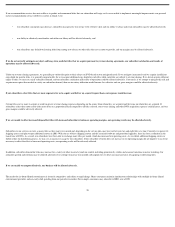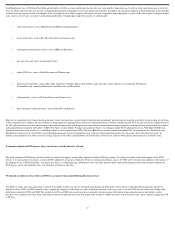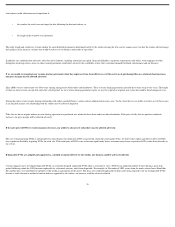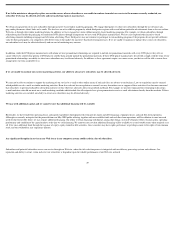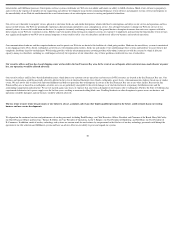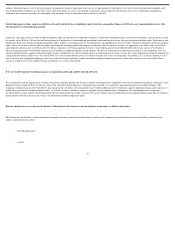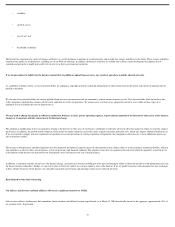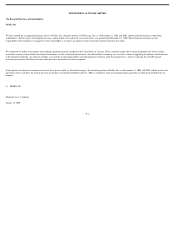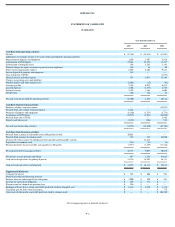NetFlix 2002 Annual Report Download - page 46
Download and view the complete annual report
Please find page 46 of the 2002 NetFlix annual report below. You can navigate through the pages in the report by either clicking on the pages listed below, or by using the keyword search tool below to find specific information within the annual report.
We will record substantial expenses related to our issuance of stock options that may have a material negative impact on our operating results for the foreseeable future.
We are required to recognize, as a reduction of stockholders’ equity, deferred compensation equal to the difference between the fair market value of our common stock for financial reporting
purposes and the exercise price of these options at the date of grant. This deferred compensation is amortized over the vesting period of the applicable options, generally three to four years,
using the graded vesting method. At December 31, 2002, approximately $11.4 million of deferred compensation related to employee stock options remained unamortized. The resulting
amortization expense will have a material negative impact on our operating results in future periods. In addition, in August and September 2001 we repriced options to purchase an aggregate
of 913,795 shares of our common stock to $3.00 per share. We cannot predict the amount of compensation expense that we will have to recognize on a quarterly basis for these repriced
options, and it could materially negatively impact our operating results for future periods.
Financial forecasting by us and financial analysts who may publish estimates of our financial results will be difficult because of our limited operating history, and our actual
results may differ from forecasts.
As a result of our growth and our limited operating history, it is difficult to accurately forecast our revenues, gross profit, operating expenses, number of paying subscribers, number of DVDs
shipped per day and other financial and operating data. The inability by us or the financial community to accurately forecast our operating results could cause our net losses in a given quarter
to be greater than expected, which could cause a decline in the trading price of our common stock. We have a limited amount of meaningful historical financial data upon which to base
planned operating expenses. We base our current and forecasted expense levels and DVD acquisitions on our operating plans and estimates of future revenues, which are dependent on the
growth of our subscriber base and the demand for titles by our subscribers. As a result, we may be unable to make accurate financial forecasts or to adjust our spending in a timely manner to
compensate for any unexpected shortfalls in revenues. We believe that these difficulties in forecasting are even greater for financial analysts that may publish their own estimates of our
financial results.
Item 7A. Quantitative and Qualitative Disclosures about Market Risk
The primary objective of our investment activities is to preserve principal, while at the same time maximizing income we receive from investments without significantly increased risk. Some
of the securities we invest in may be subject to market risk. This means that a change in prevailing interest rates may cause the principal amount of the investment to fluctuate. For example,
if we hold a security that was issued with a fixed interest rate at the then−prevailing rate and the prevailing interest rate later rises, the value of our investment will decline. To minimize this
risk in the future, we intend to maintain our portfolio of cash equivalents and short−term investments in a variety of securities. Our cash equivalents are generally invested in money market
funds, which are not subject to market risk because the interest paid on such funds fluctuates with the prevailing interest rate. We intend to limit the percentage invested in short−term
investments to no more than fifty percent of the combined fair value of cash equivalents and short−term investments. We also intend to limit the average duration on our short−term
investments to less than three years. As of December 31, 2002 all short−term investments were invested in the Vanguard Short−Term Bond Index Fund – Admiral Shares (the “Fund”). The
target index, for the Fund, the Lehman 1−5 Year Government/Credit Bond Index (the “Index”), is comprised of approximately 1,500 U.S. Treasury and agency securities and
investment−grade corporate bonds with maturities between 1 and 5 years. As of December 31, 2002 the Fund had investments in 363 issues with an average quality of Aa1/Aa2, an average
duration of 2.4 years and an average yield, net of expenses, of 2.43%. As of December 31, 2002, the cost, unrealized gain and market value of our short−term investments was $43,022,000,
$774,000 and $43,796,000, respectively.
Item 8. Financial Statements and Supplementary Data
See Financial Statements beginning on page F−1.
35


